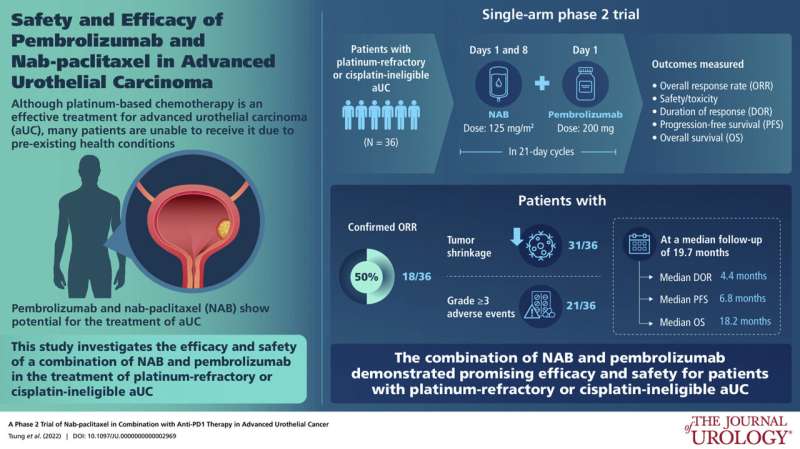
A combination of two types of cancer-fighting treatments—the immunotherapy agent pembrolizumab and a nanoparticle-bound form of the chemotherapy drug paclitaxel—may provide an urgently needed new treatment approach for patients who do not respond to or can’t receive standard chemotherapy for advanced urothelial cancers, reports a preliminary study in the Journal of Urology.
“While still experimental, the combination of these two agents offers an efficacious and feasible alternative for a group of patients for whom we don’t otherwise have effective treatment options,” comments Irene Tsung, MD, of University of Michigan, Ann Arbor.
Half of patients have at least a partial response to anti-PD1 plus nab-paclitaxel
Urothelial cancer (UC) is a type of cancer developing in the cells lining the urinary tract; most bladder cancers are UCs. The standard treatment for advanced UC is chemotherapy with platinum-based agents such as cisplatin. However, many patients do not respond to this form of chemotherapy, or cannot receive it due to other medical conditions.
Dr. Tsung and colleagues evaluated an innovative combination of two cancer treatments for use in this situation. Pembrolizumab is an anti-PD1 antibody that blocks the “programmed cell death” pathway. Developed to treat other types of advanced cancers, pembrolizumab has been used with some success in patients with advanced or metastatic UC. Nanoparticle-albumin-bound (nab) paclitaxel is a relatively new formulation of an important chemotherapy drug, created using nanotechnology to enhance effectiveness and reduce complications.
Dr. Tsung and colleagues report on 36 patients with platinum-refractory or platinum-ineligible UCs who received this combination of drugs. The first treated patients experienced a high rate of severe adverse events, such as fatigue and anemia. This problem was alleviated by reducing the starting dose of nab-paclitaxel.
Overall response rate to pembrolizumab plus nab-paclitaxel was 50%. Three patients had complete responses while 15 had partial responses; 31 of the 36 patients had at least some tumor shrinkage after combination therapy. The researchers note that the 50% response rate was substantially higher than in previous studies of pembrolizumab alone for refractory UC.
Other outcomes also showed encouraging results: median duration of response was 4.4 months, while median time without cancer progression was 6.8 months. Overall median survival time was 18.2 months.
After the nab-paclitaxel starting-dose reduction, few patients experienced severe adverse events. Ten patients had immune-related adverse events, which is consistent with previous use of single-agent anti-PD1 and other immunotherapy agents.
“[T]he combination of nab-paclitaxel and anti-PD 1 therapy offers an efficacious and feasible option for advanced urothelial cancer patients who cannot receive cisplatin or are platinum-refractory,” Dr. Tsung and coauthors write. They note that both are readily available, FDA-approved treatments with known side effect profiles. At a time when new treatment options are rapidly evolving, the researchers call for “continued exploration” of strategies combining chemotherapy and immunotherapy for advanced UC.
More information:
Irene Tsung et al, A Phase 2 Trial of Nab-paclitaxel in Combination With Anti-PD1 Therapy in Advanced Urothelial Cancer, Journal of Urology (2022). DOI: 10.1097/JU.0000000000002969
Journal information:
Journal of Urology
Source: Read Full Article